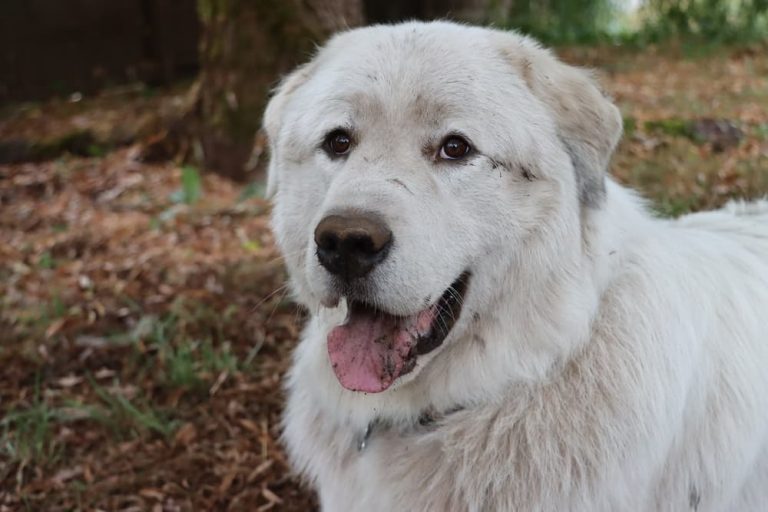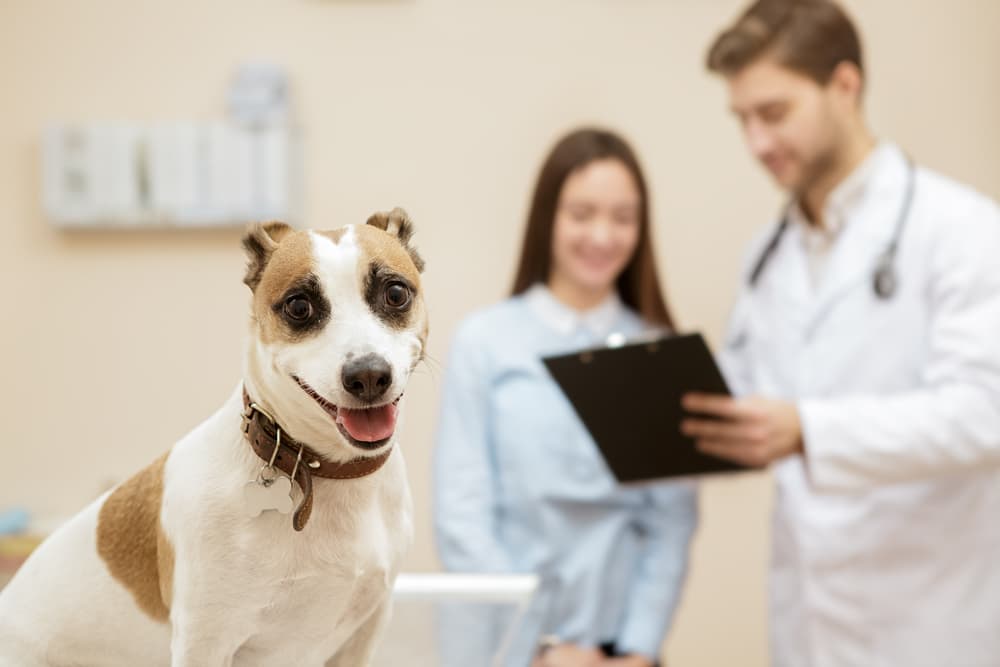Why Do Dogs Eat Dirt?

You feed your dog delicious treats and splurge on premium food, and yet he seems content with consuming dirt in the backyard. What gives?
This odd appetite for soil—while unappealing to us humans—is a common behavior canines exhibit, especially in puppyhood.
Your dog may be eating dirt and digging simply because he smells something tasty. However, if he consumes large quantities or if the behavior seems obsessive, it could be cause for concern.
Keep reading to find out why dogs eat dirt and tips to help them curb this messy habit.
Why Do Dogs Eat Dirt?

Dogs eat dirt for a variety of reasons ranging from nutritional deficiencies and behavioral issues to medical conditions such as anemia, gastrointestinal problems, or liver disease.
Dirt eating is a form of pica, which refers to the ingestion of non-food items. There are many reasons why your dog may be seeking a picnic in the public park that includes dirt, grass, sticks, stones, mulch, and bark. The reasons behind it, according to Dr. Erin Keefe of Small Door Veterinary in New York City, could be nutritional, behavioral, or medical.
If the dog is “repeatedly eating dirt, consuming large quantities, or eating it frantically,” Keefe says there could be an underlying issue that needs to be addressed.
Nutritional Deficiencies
If there are deficiencies of certain minerals in your dog’s food, he may choose to find them in the soil. For some, it may be a lack of vitamin B12 and for others it may be an iron deficiency that could lead to anemia.
Behavioral Issues
Stress, boredom, or obsessive compulsive disorder are likely behavioral causes of dirt consumption. Consider your dog’s lifestyle and observe whether your canine companion is getting enough exercise, is displaying fear or anxiety about his environment, or showing signs of other compulsive behaviors (such as obsessive licking or pacing).
Health Issues
Medical conditions, such as anemia (lack of iron or low red blood cell count), gastrointestinal problems, or liver disease can also lead to ingestion of dirt.
Why Is My Dog Eating Dirt and Throwing Up?

Dogs’ bodies are built in such a way that whenever they ingest anything inedible, they will attempt to remove the unwanted material via vomiting.
“Sometimes eating dirt and other non-food items is a sign of gastrointestinal discomfort and dogs ingest this material in an attempt to find some relief,” explains Keefe.
She adds that ingestion of a small amount of dirt and a single episode of vomiting may not warrant veterinary care. However, pet parents need to get the dog examined by a veterinarian if the dog “repeatedly vomits or gags without bringing anything up, has diarrhea, seems in discomfort, or is lethargic.”
Why Do Puppies Eat Dirt?

Puppies are naturally curious beings that love nothing more than to roll around in the grass and dig for goodies. “They are more likely to accidentally ingest dirt as they’re exploring the world,” says Keefe.
However, if you see the puppy eating dirt repeatedly, have him examined by a veterinarian to rule out any of the underlying issues listed above.
“It’s also important to discourage them from this behavior, so that it does not become a habit into adulthood,” recommends Keefe. Try redirecting your puppy away from the dirt with a toy, treat, or interactive game and use positive reinforcement when your puppy stays out of the dirt pile.
Don’t scold, yell, or punish your puppy for eating dirt as this can create conflict in your relationship and negative associations with the outdoors or your backyard down the road.
Dog Eating Dirt Risks
Eating dirt can pose a number of problems for your pooch. Taking in large quantities could cause life-threatening gastrointestinal impaction or blockage, which could require emergency surgery, according to Keefe.
In addition, dirt may contain dangerous materials that could harm your dog. Pesticides or fertilizers may be toxic, small rocks could cause damage to your dog’s teeth, and in severe cases cause choking or intestinal blockage. Sharp sticks could puncture their mouth, throat, or intestinal tract. There is also a risk of your pet ingesting intestinal parasite eggs or other infectious organisms in contaminated soil.
How to Stop Your Dog From Eating Dirt

According to Dr. Ellen M. Lindell of Veterinary Behavior Consultations, PC, it is important to learn the reason for the behavior before working on a treatment plan and giving recommendations. “The diagnosis drives the treatment.”
As there are several reasons why your dog may be interested in eating dirt, there are various ways to address and stop the behavior.
Medical Conditions
“If your pet’s dirt eating is caused by an underlying medical issue, it is important to treat this first,” recommends Keefe. Typically, baseline blood work will screen for anemia, and check organ function to determine kidney or liver disease. Once a diagnosis is made, your veterinarian will tailor a treatment plan to your dog, which should stop the dirt-eating behavior.
Nutritional Imbalance
If you have either recently changed the dog’s food or feed him a home-cooked meal, and the dog is exhibiting dirt eating, Keefe recommends speaking to your veterinarian or a veterinary nutritionist. Diagnostic tests can determine if your dog is suffering from a nutrient deficiency, at which point the veterinarian may prescribe a specific diet or supplements.
As a preventative measure, Keefe recommends feeding the pet a nutritionally complete, AAFCO-approved diet “that is certified as suitable for their size and life-stage.” Look for the AAFCO statement on the dog food bag or label to ensure the food is properly balanced.
Insufficient Enrichment
In a situation where there is a lack of mental stimulation or boredom causing dirt eating, Lindell recommends that pet parents provide enrichment that the dog prefers. “That can be food, toys, social play with the owner or other dogs.”
Keefe suggests increasing the amount of daily exercise and playtime for the dog. “You can also provide interactive toys, such as food puzzle toys to provide mental stimulation, especially when they are home alone for longer periods of time.”
If the dog is acting out of frustration or compulsive behaviors, Lindell recommends providing the dog access to “satisfying alternative behaviors such as creating search-and-find food containers in the dirt area.”
Training may also help deter your dog from digging and eating dirt. When you notice your dog heading to a corner of your yard, Lindell recommends using a leash to prevent the dog from easily accessing the ground. However, she suggests not trying to ‘correct’ by jerking a leash or scolding. “You can train a ‘leave it’ using reward-based methods.”
Training and playtime outside are important because, “the yard does not become the snack bar but represents a place to enjoy social activity,” according to Lindell.
Stress
“Stress can also be a contributing factor in the development of behavioral issues,” adds Keefe. Some stress triggers in your dog’s life may include changes in their routine or environment, especially with pet parents returning to offices after a prolonged period at home. These dogs can benefit from having a “safe space” in the home to retreat where they feel comfortable.
Some natural therapies and products may also help relieve anxiety. Keefe recommends pheromone collars or anxiety wraps. Calming treats or supplements may also help reduce stress in dogs. For severe stress and anxiety issues, Keefe suggests enlisting “the help of a behavioral specialist who can assist with techniques such as desensitization and counterconditioning.”
When to Seek Medical Attention
 If your dog occasionally consumes small amounts of dirt and does not have any other symptoms to indicate an underlying issue, it is not likely a cause for concern.
If your dog occasionally consumes small amounts of dirt and does not have any other symptoms to indicate an underlying issue, it is not likely a cause for concern.
But it’s important to pay attention to the frequency of your dog’s dirt-eating behavior and the amount your dog consumes. “If the dirt eating occurs more often, large amounts are ingested, or you notice any other concerning symptoms such as gastrointestinal or behavioral changes,” pet parents should seek medical attention, says Keefe.
Additionally, if your dog suddenly decides to chow down on dirt, it could be a red flag and should be discussed with your veterinarian. “A sudden onset may indicate a new underlying issue that needs treatment,” adds Keefe.









